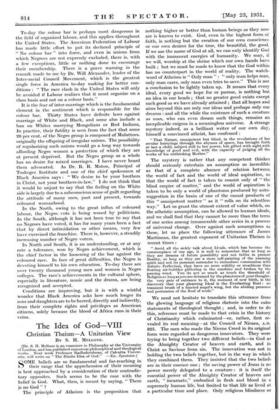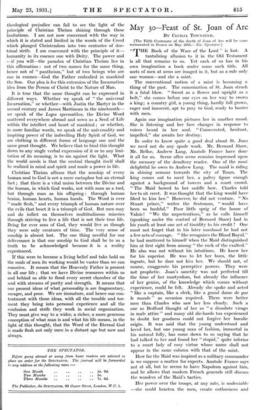The Idea of God—VIII
Christian Theism—A Unitarian View
BY S. H. MELLONE.
[Dr. S. H. Mellon is an examiner in Philosophy at the University of London, and has published numerous philosophical and theological works. Next week Professor Radhakrishnan, of Calcutta Univer- sity, will write on " The Hindu Idea of God." —ED. Spectator.] SOME beliefs are so fundamental and far-reaching in their range that the apprehension of their meaning is best approached by a consideration of their contradic- tory opposites. Such seems to be the case with the belief in God. What, then, is meant by saying, " There is no God " ?
The principle of Atheism is the proposition that nothing higher or better than human beings as they now are is known to exist. God, even in the highest form of • faith, is nothing but the creation of our own conscience or our own .desires for the true, the beautiful, the good. If we use the name of God at all, we can only identify God with the immanent energies of humanity. We may, if we will, worship at the shrine which our own hands have built ; but we must be made to know that the God within has no counterpart in the world of reality. The watch- word of Atheism is " Only man " : " only man helps man, only man cares, only man even tries to save." This is not a conclusion to be lightly taken up. It means that every ideal, every good we hope, for or pursue, is nothing but an idea in our heads ; that no greater good exists except such good as we have already attained ; that all hopes and aims beyond this are only our ideas and perhaps only our dreams : and all the while the existence of such a creature as man, who can even dream such things, remains an inexplicable enigma in a meaningless universe. A strange mystery indeed, as a brilliant writer of our own day, himself a convinced atheist, has confessed : " That Nature, omnipotent but blind, in the revolutions of her secular hurryings through the abysses of space, has brought forth at last a child, subject still to her power, but gifted with sight,with knowledge of good and evil, with the capacity of judging all the works of his unthinking Mother."
The mystery is rather that any competent thinker should seriously entertain an assumption so incredible as that of a complete absence of relation between the world of fact and the world of ideal aspiration, so that the world of fact is taken to consist only of " the blind empire of matter," and the world of aspiration is taken to be only a world of phantoms produced by auto- suggestion in the brain of one of the casual products of this " omnipotent matter " as it " rolls on its relentless way." Let us grant the utmost extent of value which, on the atheistic assumption, can be allowed to human ideals, and we shall find that they cannot be more than the term of one series among innumerable other series in a process of universal change. Over against such assumptions as these, let us place the following utterance of James Martineau, the greatest exponent of Unitarian Theism in recent times : " Amid all the sickly talk about Ideals, which has become the commonplace of 'our age, it is well to remember that so long as they are dreams of future possibility and not faiths in present Reality, so long as they are a mere self-painting of the yearning spirit and not its personal surrender to immediate communion with Infinite Perfection, they have no more solidity or steadiness than floating air-bubbles glittering in the sunshine and broken by the passing wind. You do not so much as touch the threshold of Religion so long as you are detained by the phantoms of your thought ; the very gate of entrance to it, the moment of new birth, is the discovery that your gleaming Ideal is the Everlasting Real : no transient brush of a fancied angel's wing, but the abiding presence and persuasion of the Soul of souls."
We need not hesitate to translate this utterance from the glowing language of religious rhetoric into the calm statements of theological thought ; and, in order to do this, reference must be made to that crisis in the- history of Christianity which culminated—or, rather, first re- vealed its real meaning—at the Council of Nicaea, A.D. 825. The men who made the Nicene Creed in its original form were regarded as dangerous innovators. They were trying to bring together two different beliefs—in God as the Almighty Creator of heaven and earth, and in Christ as Saviour from sin. The innovation was not in holding the two beliefs together, but in the way in which they combined them. They insisted that the two beliefs are in their essence one ; the saving power of Jesus is no power merely delegated to a creature : it is itself the essential power of the Almighty Creator. of 'heaven and earth, " incarnate," embodied in flesh and blood in a supremely human life," but limited to-that life as lived at a particular time and place. Only religious blindness or theological prejudice can fail to see the light of the principle of Christian Theism shining through these limitations. I am not now concerned with the way in which it is stated and limited in the words of the Creed which plunged Christendom into two centuries of doc- trinal strife. I am concerned with the principle of it— humanity in its essence one with Deity. The power and —if you will—the paradox of Christian Theism lies in this affirmation : not of two names for the same thing, hence not of pantheism," but of two beings who are one in essence—God the Father embodied in mankind the Son. Our plea is for this extension of the Incarnation idea from the Person of Christ to the Nature of Man.
It is true that the same thought can be expressed in different ways. Whether wg speak of " the universal Incarnation," or whether—with Justin the Martyr in the second century and James Martineau in the nineteenth— we speak of the Logos spermatikos, the Divine Word scattered everywhere abroad and sown as a Seed of Life within the intellect and heart of mankind ; or whether, in more familiar words, we speak of the universality and inspiring power of the indwelling Holy Spirit of God, we are clothing in different forms of language one and the same great thought. We believe that to bind this thought down to any single verbal expression of it or to any limi- tation of its meaning, is to sin against the light. What the world needs is that the central thought itself shall be realized in mind and spirit and made a power in life.
Christian Theism affirms that the sonship of every human soul to God is not a mere metaphor but an eternal fact ; that there is a vital union between the Divine and the human, in which God works, not with man as a tool, but through man as his offspring : through human brains, human hearts, human hands. The Word is ever " made flesh," and every triumph of human nature over the evils that beset it is a triumph of God. But men may and do inflict on themselves multitudinous miseries through striving to live a life that is not their true life. Being for ever sons of God, they would live as though they were only creatures of time. The very sense of sonship is almost lost. The one thing needful for our deliverance is that our sonship to God shall be to us a truth to be acknowledged , because it is a reality experienced.
If this were to become a living belief and take hold on the souls of men .its working would be vaster than we can conceive. It means that the Heavenly Father is present in all our life ; that we have Divine resources within us and behind us able to flood every secret chamber of the soul with streams of purity and strength. It means that our present ideas of what personality is are fragmentary, meagre, and poor. We are immature, and hence our con- tentment with these ideas, with all the trouble and tor- ment they bring into personal experience and all the confusion and strife they work in social organization. They must give way to a wider, a richer, a more generous conception of what man is and what his life means, in the light of this thought; that the Word of the Eternal God is made flesh not only once in a distant age but now and always.







































 Previous page
Previous page